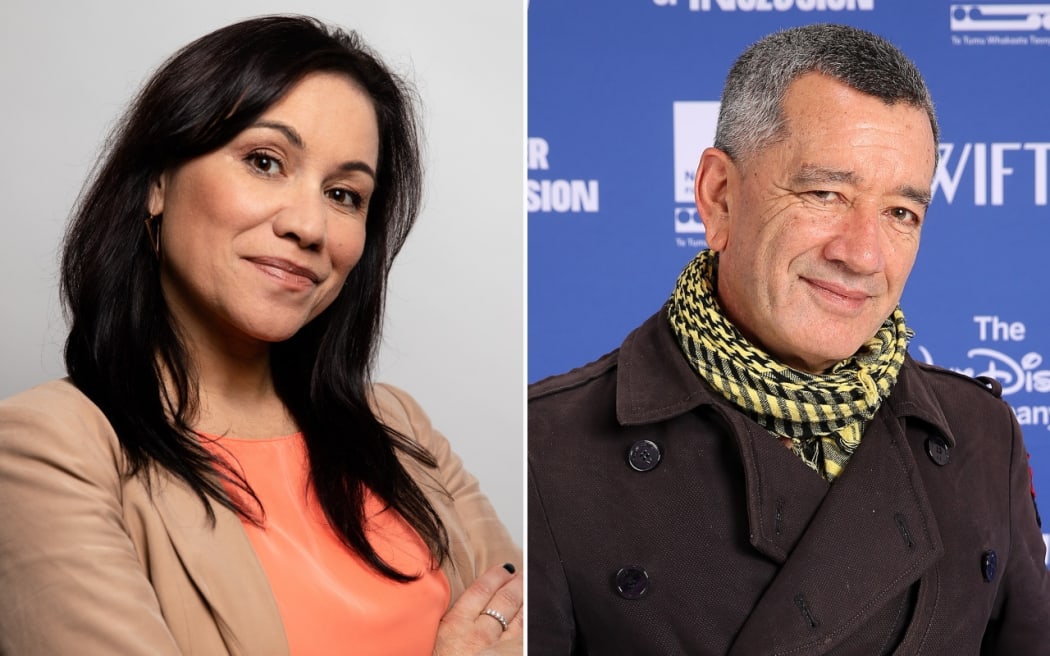In 1995, five young talented Māori became the front for a new show called Mai Time.
For the first time on New Zealand television, the show put Māori rangitahi front and centre with the mix of entertainment, comedy, music and te reo Māori.
Stacey Morrison, nee Daniels was one of the show's first hosts and Tainui Stephens came up with the concept.
They both joined Jesse Mulligan to talk about their memories of the ground-breaking show, and the platform it gave to young Māori talent.
Stephens says they were experimenting with programming on Sunday mornings - a commercial-free slot - to figure out how to serve rangatahi and work towards commercially viable Māori television.
"In '93, we did the pilot and we took it upstairs to see if they would give us a mainstream slot.
"And they were actually kind of angry that we were making programming for young Māori who they said in that day would just be in the Spacies Parlours, working on their Spacies and just playing games"
But Stephens and the team continued to pursue their project and in 1994, when a new boss for programming came along, he was open to the idea, he says.
They wanted to work with Morrison because she represented Māori youth who didn't know the language but wanted to learn, he says.
"So with our posse of five, we tried to cover as many team types, momo, as we could."
Morrison says she was just trying to find her feet at Marae TV when she got the gig.
"There was pressure in a way that I was very aware I was a Māori TV presenter, not just a presenter, so I ended up doing TV 2 updates, but I was always really mindful that if I stuffed up, I was the Māori TV presenter who stuffed up."
The creators were also conscious of the responsibility that came with building the Mai Time presenters' TV personalities, Stephens says.
"We didn't just want to have any stars, [we wanted them to be] whether you call them role models or elder brothers and sisters in the whānau, who are our audience, and who are us.
"I think the safest way to navigate all that is by being your beautiful self and these people were able to do that."
The show aimed to look at what rangatahi are interested in from trends to music, relationships, and fashion.
"I'm very fond of saying that [on] our very first episode, we were able to play How Bizarre [by] OMC because no-one else wanted to play it. And that's what kind of Mai Time became; it was a bit of a taste leader in many ways," Stephens says.

Stacey Morrison and Tainui Stephens. Photo: RNZ / Dan Cook, Getty Images / Fiona Goodall
"I remember a frightening day later in the '90s, Stace turned up, there was brief resurgence of the '70s [styles], and this sister turned up one day with flares and platform shoes, and that was a moment."
A big drawcard for the show was the music, Morrison says, with about five or six songs playing during the hour.
"I admit that sometimes I used to pretend I knew who they were talking about but I didn't and so they'd say like 'Ghostface Killah' and I'd go 'yeah... Ghostface Killah...'
"They all followed American acts that I didn't know, but then some of the stuff they made as Dam Native ... it's really good reo Māori rapping, it had quite a range, but sometimes we were criticised for being too American."
There was a growing culture of political correctness at the time, Stephens says, and rangatahi could relate to some of what was expressed in America's hip hop and R'n'B scenes.
"It wasn't just about the groove and the fashions, our young people are thinkers and they're aware of a world that's sort of rapidly growing and we're all connected in so many ways and so we were able to explore that in fun ways."
The bilingual approach was pretty rare at the time, Morrison says, and the presenters intuitively paraphrased the reo.
"We learnt a lot as we went but we had people there who were already creating Te Karere Marae Waka Huia, so we had that expertise to lean on, but we were probably seen as more light and fluffy.
"We were actually just trying to make it relevant to our audience, so they'd stay onboard."
As the years go by, Morrison says she recognises the show's influence.
"[There's] people telling me now they used to record it, sometimes you don't know what it means to you at the time until there's some years in the distance and you go 'okay that made me feel like I could relate to people', so that's what's important to me is that it still has that place in some people's hearts and minds."
"It was just a different way of being and showing that it was cool to be Māori and that there are different ways we could express that.
"I feel very fortunate, we didn't realise - I don't think we could've realised it at the time that it was quite influential to the people who watched it."
Stephens says it gained good ratings and made rangatahi feel proud to be Māori.

